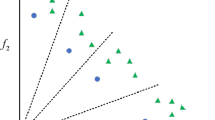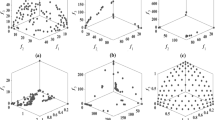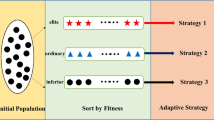Abstract
Canonical particle swarm optimization (PSO) utilizes the historical best experience and neighborhood’s best experience of particle through linear summation to guide its search direction. Such a learning strategy is easy to use, but is inefficient when searching in the complex problem space since the global best individual only considers the fitness value but always ignores the diversity information. Hence, designing learning strategies where the guidance exemplar simultaneously considers the fitness value and diversity have become one of the most salient and active PSO research topics. In this paper, a multiobjective sorting-based learning (MSL) strategy for PSO is proposed and this modified PSO is named as multiobjective sorting-based learning particle swarm optimization. The MSL strategy can guide particles to fly in better direction by constructing a guidance exemplar with better fitness value and diversity. Since the fitness value and diversity are simultaneously considered to construct the guidance exemplar instead of the global best individual in canonical PSO, a better balance between exploration and exploitation can be achieved. The proposed strategy is applied to the original PSO algorithm, as well as several advanced PSO variants. Experimental results on sixteen benchmark problems show that the proposed strategy is an effective approach to enhance the performance of most PSO algorithms studied in terms of solution quality, convergence speed and algorithm reliability.


Similar content being viewed by others

References
Akbari R, Ziarati K (2011) A rank based particle swarm optimization algorithm with dynamic adaptation. J Comput Appl Math 235:2694–2714
Angeline PJ (1998) Using selection to improve particle swarm optimization. In: Proceedings of the IEEE international conference on computational intelligence, pp 84–89
Auger A, Hansen N (2005) Performance evaluation of an advanced local search evolutionary algorithm. In: Proceedings of the IEEE congress on evolutionary computation, vol 1772, pp 1777–1784
Clerc M, Kennedy J (2002) The particle swarm-explosion, stability, and convergence in a multidimensional complex space. IEEE Trans Evol Comput 6:58–73
Coelho LS (2009) An efficient particle swarm approach for mixed-integer programming in reliability-redundancy optimization applications. Reliab Eng Syst Safe 94(4):830–837
Coello CCA, Pulido GT, Lechuga MS (2004) Handling multiple objectives with particle swarm optimization. IEEE Trans Evol Comput 8(3):256–279
Corriveau G, Guilbault R, Tahan A, Sabourin R (2012) Review and study of genotypic diversity measures for real-coded representations. IEEE Trans Evol Comput 16(5):695–710
Derrac J, García S, Molina D, Herrera F (2011) A practical tutorial on the use of nonparametric statistical tests as a methodology for comparing evolutionary and swarm intelligence algorithms. Swarm Evol Comput 1(1):3–18
Elbeltagi E, Hegazy T, Grierson D (2005) Comparison among five evolutionary-based optimization algorithms. Adv Eng Inform 19:43–53
Fan S, Zahara E (2007) A hybrid simplex search and particle swarm optimization for unconstrained optimization. Eur J Oper Res 181:527–548
Franken N, Engelbrecht AP (2005) Particle swarm optimization approaches to coevolve strategies for the iterated prisoner’s dilemma. IEEE Trans Evol Comput 9(6):562–579
García S, Molina D, Lozano M, Herrera F (2009) A study on the use of non-parametric tests for analyzing the evolutionary algorithms behaviour: a case study on the CEC2005 special session on real parameter optimization. J Heuristics 15:617–644
Huang H, Qin H, Hao Z, Lim A (2012) Example-based learning particle swarm optimization for continuous optimization. Inf Sci 182:125–138
Kang Q, Wang L, Wu Q (2008) A novel ecological particle swarm optimization algorithm and its population dynamics analysis. Appl Math Comput 205(1):61–72
Kao YT, Zahara E (2008) A hybrid genetic algorithm and particle swarm optimization for multimodal functions. Appl Soft Comput 8:849–857
Kennedy J, Eberhart RC (1995) Particle swarm optimization. In: Proceedings of the IEEE international conference on neural network, vol 4. IEEE Press, Piscataway, pp 1942–1948
Liang JJ, Suganthan PN (2005) Dynamic multi-swarm particle swarm optimizer. In: Proceedings of the IEEE swarm intelligence symposium, pp 124–129
Liang JJ, Suganthan PN, Deb K (2005) Novel composition test functions for numerical global optimization. In: Proceedings of the IEEE swarm intelligence symposium, pp 1–14
Liang JJ, Qin AK, Suganthan PN, Baskar S (2006) Comprehensive learning particle swarm optimizer for global optimization of multimodal functions. IEEE Trans Evol Comput 10:281–295
Liu RC, Wang LX, Ma WP, Mu CH, Jiao LC (2014) Quadratic interpolation based orthogonal learning particle swarm optimization algorithm. Nat Comput 13:17–37
Ma G, Zhou W, Chang XL (2012) A novel particle swarm optimization algorithm based on particle migration. Appl Math Comput 218:6620–6626
Mendes R, Kennedy J, Neves J (2004) The fully informed particle swarm: simpler, maybe better. IEEE Trans Evol Comput 8(3):204–210
Messerschmidt L, Engelbrecht AP (2004) Learning to play games using a PSO-based competitive learning approach. IEEE Trans Evol Comput 8(3):280–288
Nezhad AM, Mahlooji H (2011) A revised particle swarm optimization based discrete Lagrange multipliers method for nonlinear programming problems. Comput Oper Res 38:1164–1174
Ong YS, Keane AJ (2004) Meta-Lamarckian learning in memetic algorithms. IEEE Trans Evol Comput 8(2):99–110
Pasti R, Castro LN (2009) Bio-inspired and gradient-based algorithms to train MLPs: the influence of diversity. Inf Sci 179(10):1441–1453
Ratnaweera A, Halgamuge S, Watson H (2004) Self-organizing hierarchical particle swarm optimizer with time-varying acceleration coefficients. IEEE Trans Evol Comput 8(3):240–255
Shang YW, Qiu YH (2006) A note on the extended Rosenbrock function. Evol Comput 14(1):119–126
Shi YH, Eberhart RC (1998a) Comparison between genetic algorithms and particle swarm optimization. In: Proceedings of 7th the international conference on evolutionary program, LNCS 1447, pp 611–616
Shi YH, Eberhart RC (1998b) A modified particle swarm optimizer. In: Proceedings of the IEEE international conference on evolutionary computation, pp 69–73
Shi YH, Eberhart RC (1999) Empirical study of particle swarm optimization. In: Proceedings of the IEEE congress on evolutionary computation, pp 1945–1950
Shi YH, Liu H, Gao L, Zhang G (2011) Cellular particle swarm optimization. Inf Sci 181:4460–4493
Shu J, Li J (2009) An improved self-adaptive particle swarm optimization algorithm with simulated annealing. In: Proceedings of the third international symposium intelligent information technology application, pp 396–399
Suganthan PN, Hansen N, Liang JJ, Deb K, Chen YP, Auger A, Tiwari S (2005) Problem definitions and evaluation criteria for the CEC 2005 special session on real-parameter optimization. In: Proceedings of the congress on evolutionary computation, pp 1–50
Tang Y, Wang ZD, Fang JA (2011) Feedback learning particle swarm optimization. Appl Soft Comput 11(8):4713–4725
Thangaraj R, Pant M, Abraham A (2009) A new diversity guided particle swarm optimization with mutation, In: Proceedings of world congress on nature and biologically inspired computing, pp 294–299
Wang Y, Li B, Weise T, Wang J, Yuan B, Tian Q (2011a) Self-adaptive learning based particle swarm optimization. Inf Sci 181:4515–4538
Wang H, Wu Z, Rahnamayan S, Liu Y, Ventresca M (2011b) Enhancing particle swarm optimization using generalized opposition-based learning. Inf Sci 181:4699–4714
Wang HF, Moon I, Yang SX, Wang DW (2012) A memetic particle swarm optimization algorithm for multimodal optimization problems. Inf Sci 197:38–52
Wang H, Sun H, Li CH, Rahnamayan S, Pan JS (2013) Diversity enhanced particle swarm optimization with neighborhood search. Inf Sci 223:119–135
Wang JH, Liao JJ, Zhou Y, Cai YQ (2014) Differential evolution enhanced with multiobjective sorting-based mutation operators. IEEE Trans Cybernet. doi:10.1109/TCYB.2014.2316552
Wong WK, Leung SYS, Guo ZX (2012) Feedback controlled particle swarm optimization and its application in time-series prediction. Expert Syst Appl 39(10):8557–8572
Xu G (2012) Multi-objective Optimization of MIMO plastic injection molding process conditions based on particle swarm optimization. Int J Adv Manuf Tech 58(5–8):521–531
Xu G (2013) An adaptive parameter tuning of particle swarm optimization algorithm. Appl Math Comput 219:4560–4569
Zhan ZH, Zhang J, Li Y, Chung HSH (2009) Adaptive particle swarm optimization. IEEE T Syst Man Cy B 39(6):1362–1381
Zhan ZH, Zhang J, Li Y, Shi YH (2011) Orthogonal learning particle swarm optimization. IEEE Trans Evol Comput 15:832–847
Zhao X (2010) A perturbed particle swarm algorithm for numerical optimization. Appl Soft Comput 10(1):119–124
Acknowledgments
This work is supported by the National Nature Science Foundation of China (Grant 61175127, 11101204), the Nature Science Foundation of Jiangxi Province China (Grant 20142BAB211021) and the Science and Technology Plan Project of Jiangxi Provincial Education Department China (Grant GJJ12093) and the author would like to thank Prof. Jose A. Lozano for revision of grammar about this work.
Author information
Authors and Affiliations
Corresponding author
Rights and permissions
About this article
Cite this article
Xu, G., Liu, B., Song, J. et al. Multiobjective sorting-based learning particle swarm optimization for continuous optimization. Nat Comput 18, 313–331 (2019). https://doi.org/10.1007/s11047-016-9548-3
Published:
Issue Date:
DOI: https://doi.org/10.1007/s11047-016-9548-3



